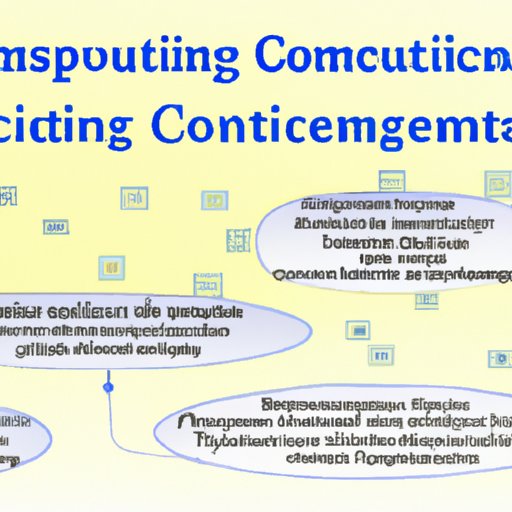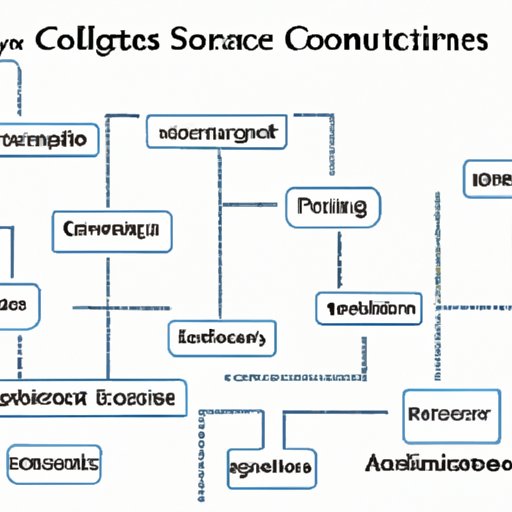Introduction
Abstraction in computer science is a process that allows for simplifying complex concepts and processes into more manageable parts. It is a key component of programming and software engineering, as it enables programmers and engineers to break down problems into smaller, more easily understandable components. By leveraging abstraction, computer scientists can develop solutions to complex problems much faster and easier than if they had to tackle the entire problem at once. This article will explore what abstraction is in computer science, its benefits and uses, and how it can be applied to solve complex problems.

Exploring the Definition and Applications of Abstraction in Computer Science
Abstraction is a fundamental concept in computer science, which involves taking a large, complicated system or process and breaking it down into smaller, simpler components. Through abstraction, computer scientists can identify the essential elements of a system while ignoring irrelevant details. This process helps them to focus on the most important aspects of any given problem and simplify the overall task.
At its core, abstraction is a way of thinking about complex systems and processes. It allows computer scientists to better understand the underlying structure of a system and uncover patterns or relationships between different components. This knowledge can then be used to create more efficient algorithms and data structures, enabling quicker and more accurate problem-solving.
A Comprehensive Guide to Understanding Abstraction in Computer Science
In order to fully understand the concept of abstraction in computer science, it is important to explore the relationship between abstraction and computer science, analyze the impact of abstraction on computer science, and investigate the benefits of applying abstraction in computer science.
First, abstraction is closely related to computer science because it involves taking a complex system and reducing it to its most basic components. This process helps computer scientists to better understand the structure of a system and identify patterns or relationships between different components. By doing so, they are able to create more effective algorithms and data structures, making it easier to solve complex problems quickly and accurately.
Second, abstraction has a significant impact on computer science because it enables computer scientists to break down complex systems into simpler, more manageable parts. This process helps them to focus on the most important aspects of any given problem and simplify the overall task. As a result, computer scientists are able to develop solutions to complex problems much faster and easier than if they had to tackle the entire problem at once.
Finally, abstraction can be beneficial for computer science because it can help reduce complexity and improve problem-solving skills. By breaking down a complex problem into smaller, more manageable parts, it is easier for computer scientists to identify the essential elements of a system and uncover patterns or relationships between different components. This knowledge can then be used to create more efficient algorithms and data structures, enabling quicker and more accurate problem-solving.

Understanding Abstraction: The Basics of Computer Science
In order to truly understand the basics of abstraction in computer science, it is important to break down abstraction for computer science, analyze the role of abstraction in problem solving, and examine the use of abstraction in language processing.
Breaking down abstraction for computer science involves understanding the core concepts of abstraction such as reduction and generalization. Reduction involves taking a large, complicated system and breaking it down into smaller, more manageable parts. Generalization involves identifying the essential elements of a system and ignoring irrelevant details. By understanding these two concepts, computer scientists can better understand the structure of a system and create more effective algorithms and data structures.
Analyzing the role of abstraction in problem solving is another important aspect of understanding abstraction in computer science. Abstraction can be used to simplify complex concepts and processes, allowing computer scientists to focus on the most important aspects of any given problem and simplify the overall task. This can help them to develop solutions to complex problems much faster and easier than if they had to tackle the entire problem at once.
Lastly, examining the use of abstraction in language processing is a key part of understanding abstraction in computer science. Abstraction can be used to create more efficient language processing algorithms, which can help computer scientists to quickly identify patterns or relationships between different components. This can be helpful for tasks such as natural language processing, which requires computer scientists to identify patterns and relationships between words, phrases, and sentences.

Abstraction in Computer Science: Unveiling the Concepts and Techniques
To gain a deeper understanding of abstraction in computer science, it is important to investigate the various levels of abstraction, explore the role of abstraction in data structures, and analyze the use of abstraction in algorithms.
Investigating the various levels of abstraction involves understanding the differences between low-level and high-level abstractions. Low-level abstractions involve focusing on the most basic components of a system, while high-level abstractions involve focusing on the more complex aspects of a system. By understanding the differences between low-level and high-level abstractions, computer scientists can better identify patterns and relationships between different components.
Exploring the role of abstraction in data structures involves understanding how abstraction can be used to create more efficient data structures. Abstraction can be used to simplify complex data structures, allowing computer scientists to focus on the essential elements of a system and ignore irrelevant details. This can help them to create more efficient algorithms and data structures, making it easier to solve complex problems quickly and accurately.
Analyzing the use of abstraction in algorithms involves understanding how abstraction can be used to create more efficient algorithms. Abstraction can be used to simplify complex algorithms, allowing computer scientists to focus on the most important aspects of any given problem and simplify the overall task. This can help them to develop solutions to complex problems much faster and easier than if they had to tackle the entire problem at once.
Abstraction in Computer Science: An Overview of its Benefits and Uses
When considering the benefits and uses of abstraction in computer science, it is important to compare the pros and cons of abstraction, examine the advantages of abstraction in computer science, and assess the limitations of abstraction.
Comparing the pros and cons of abstraction involves understanding the benefits and drawbacks of using abstraction in computer science. On one hand, abstraction can be beneficial for computer science because it can help reduce complexity and improve problem-solving skills. On the other hand, abstraction can have some drawbacks, such as making it difficult to understand the underlying structure of a system and creating a disconnect between the abstracted model and the actual system.
Examining the advantages of abstraction in computer science involves understanding how abstraction can be used to simplify complex concepts and processes, improve problem-solving skills, and create more efficient algorithms. By breaking down a complex system into smaller, more manageable parts, computer scientists are able to focus on the most important aspects of any given problem and simplify the overall task. This can help them to develop solutions to complex problems much faster and easier than if they had to tackle the entire problem at once.
Assessing the limitations of abstraction involves understanding the potential drawbacks of using abstraction in computer science. Abstraction can make it difficult to understand the underlying structure of a system and create a disconnect between the abstracted model and the actual system. Additionally, abstraction can lead to oversimplification, which can limit the accuracy of solutions to complex problems.
Conclusion
In conclusion, abstraction in computer science is a process that allows for simplifying complex concepts and processes into more manageable parts. It is a key component of programming and software engineering, as it enables programmers and engineers to break down problems into smaller, more easily understandable components. By leveraging abstraction, computer scientists can develop solutions to complex problems much faster and easier than if they had to tackle the entire problem at once.
Abstraction can be beneficial for computer science because it can help reduce complexity and improve problem-solving skills. Additionally, abstraction can be used to simplify complex concepts and processes, improve problem-solving skills, and create more efficient algorithms. However, abstraction can also have some drawbacks, such as making it difficult to understand the underlying structure of a system and creating a disconnect between the abstracted model and the actual system.
Overall, abstraction is an important concept in computer science, and understanding the basics of abstraction is essential for any programmer or software engineer. By leveraging abstraction, computer scientists can develop solutions to complex problems much faster and easier than if they had to tackle the entire problem at once.
(Note: Is this article not meeting your expectations? Do you have knowledge or insights to share? Unlock new opportunities and expand your reach by joining our authors team. Click Registration to join us and share your expertise with our readers.)
